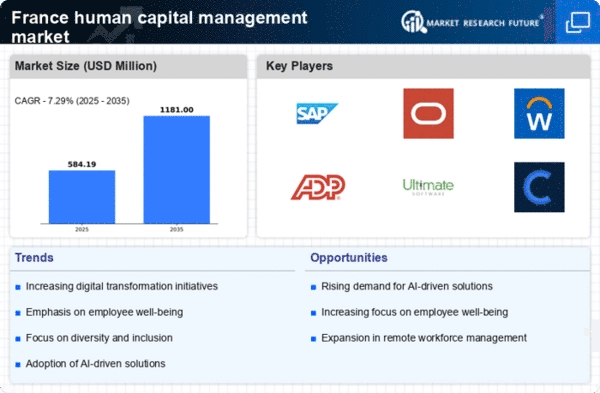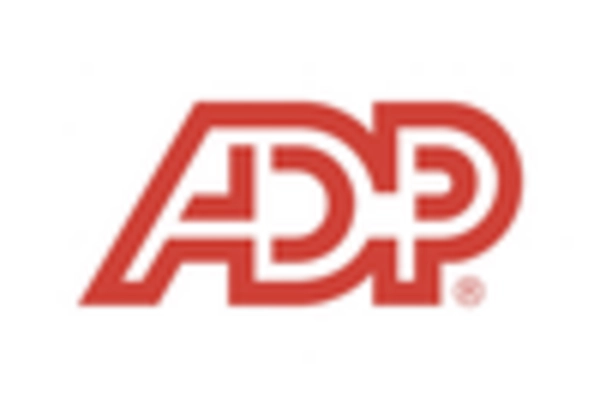Shift Towards Remote Work
The human capital-management market in France is experiencing a notable shift towards remote work arrangements. This trend has been accelerated by the increasing acceptance of flexible work environments, which has prompted organizations to rethink their human capital strategies. Companies are now focusing on implementing robust human capital-management systems that support remote workforce management, including performance tracking, employee engagement, and communication tools. According to recent data, approximately 30% of the French workforce is expected to work remotely by 2026, necessitating the adoption of innovative human capital-management solutions. This shift not only enhances employee satisfaction but also allows organizations to tap into a broader talent pool, thereby driving growth in the human capital-management market.
Regulatory Compliance and Labor Laws
the human capital management market is significantly influenced by the evolving landscape of regulatory compliance and labor laws. The French government has implemented various labor reforms aimed at enhancing employee rights and workplace conditions. For instance, the introduction of the 'Loi Travail' has necessitated organizations to adapt their human capital strategies to ensure compliance. This has led to an increased demand for human capital-management solutions that facilitate adherence to these regulations. Companies are investing in software and services that help manage employee contracts, monitor working hours, and ensure compliance with health and safety standards. As a result, the market is projected to grow at a CAGR of approximately 8% over the next five years, driven by the need for organizations to navigate complex labor regulations effectively.
Adoption of Data-Driven Decision Making
The adoption of data-driven decision making is emerging as a pivotal driver in the human capital-management market in France. Organizations are increasingly leveraging data analytics to inform their human capital strategies, enabling them to make more informed decisions regarding recruitment, performance management, and workforce planning. The integration of advanced analytics tools allows companies to identify trends and patterns in employee behavior, which can lead to improved retention rates and enhanced productivity. It is estimated that organizations utilizing data-driven approaches in their human capital-management practices can achieve up to a 15% increase in operational efficiency. This trend underscores the growing importance of analytics in shaping the future of the human capital-management market.
Focus on Employee Engagement and Retention
The human capital-management market in France is witnessing a heightened focus on employee engagement and retention strategies. Organizations are increasingly aware that engaged employees are more productive and less likely to leave, which has prompted a shift in human capital-management practices. Companies are investing in tools that measure employee satisfaction and provide insights into workforce dynamics. Recent surveys indicate that organizations with high employee engagement levels experience a 20% increase in productivity. Consequently, the demand for human capital-management solutions that enhance employee engagement, such as feedback systems and recognition programs, is on the rise. This trend is likely to shape the future of the human capital-management market as companies strive to create a more engaged workforce.
Investment in Employee Training and Development
Investment in employee training and development is a critical driver for the human capital-management market in France. Organizations are increasingly recognizing the importance of upskilling their workforce to remain competitive in a rapidly changing business environment. The French government has also introduced initiatives to promote lifelong learning, which encourages companies to invest in their employees' professional development. As a result, the market for human capital-management solutions that facilitate training and development programs is expanding. Reports indicate that companies are allocating up to 5% of their annual budgets towards employee training, which is expected to boost the demand for human capital-management platforms that offer learning management systems and performance evaluation tools.
















